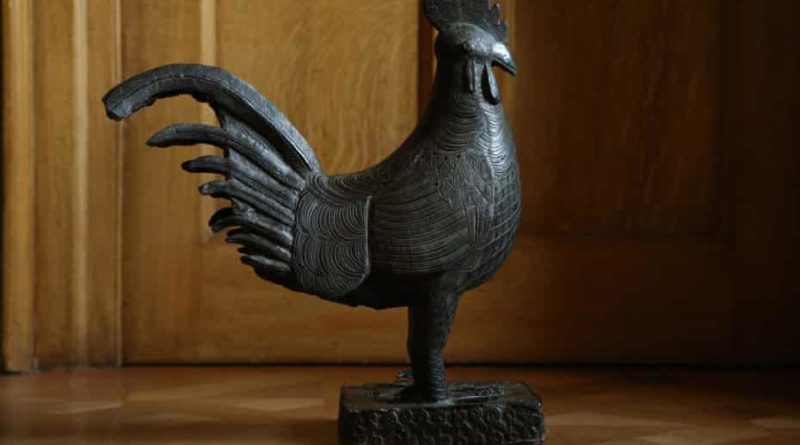First College in the UK to return looted Benin bronze
In what has been hailed as a “historic occasion,” a Cambridge college will become the first British university to return one of the Benin bronzes to Nigeria later this month.
On October 27, the bronze cockerel will be returned to Nigerian delegates by Jesus College, University of Cambridge, in a handover ceremony that Nigerian officials say gives “hope for amicable resolutions” to ongoing issues over cultural property ownership.
The Okukor, described by the college as a “royal ancestral heirloom,” was plundered by British forces during a punitive expedition in 1897 that looted thousands of bronzes from the kingdom of Benin, which was ultimately merged into Nigeria.
As the cultural world grapples with ethical problems over plundering historical relics, its return is expected to inspire a wave of repatriation ceremonies.
“We are indeed very pleased and commend Jesus College for taking this lead in making restitution for the plunder that occurred in Benin in 1897,” said the oba of Benin, Omo N’Oba N’Edo Uku Akpolokpolo, Ewuare II.
“We truly hope that others will expedite the return of our artworks which in many cases are of religious importance to us. We wish to thank [Nigeria’s] President Buhari and our National Commission for Museums and Monuments for their renewed efforts in securing the release of our artefacts on our behalf.”
The oba also expressed gratitude to the Cambridge student body for “bringing to light the historical significance of this valued component of Benin’s royal court”.”
The Okukor was removed from public display at the college in 2016 after students demanded that it be returned. The college therefore formed the Legacy of Slavery Working Party (LSWP), which included fellows, staff, and student representatives, to investigate the historical, legal, and moral status of its bronze ownership.
Evidence analyzed by the LSWP revealed that the statue was looted directly from the Benin court and handed to the institution in 1905 by the parent of a student.
After Jesus College announced its decision to return the bronze in November 2019, a slew of regional museums pledged to return items or stated that they were considering it.
Hundreds of Benin bronzes — plaques and sculptures manufactured by Edo culture artisans dating from the 13th century – are kept in the UK. They were distributed from private collections and, in certain cases, from soldiers who participated in the plunder in 1897. The British Museum, which houses 900 artifacts and is the world’s largest collection, has received a lot of attention in the past.
Sonita Alleyne, the master of Jesus College, said:
“This is an historic moment … it is the right thing to do out of respect for the unique heritage and history of this artefact.
“I would like to thank the LSWP for its diligent and careful investigation into the provenance of the bronze, to the fellows for their keen support for its restitution, and to our students who pioneered early calls for this.”
When Bernie Grant, one of Britain’s first black MPs, made strident appeals for their repatriation in the 1990s, the campaign to recover Benin bronzes gathered traction. However, it’s been a heated subject that’s recently erupted into culture war squabbles.
Oliver Dowden, the then-culture secretary, opposed to “the removal of statues or other such artifacts” earlier this year, urging museums to “protect our culture and history against the noisy minority of radicals continually trying to bring Britain down.”
Lai Mohammed, Nigeria’s minister of information and culture, thanked Jesus College for being “a trailblazer”. “We look forward to a similar return of our artefacts by other institutions that are in possession of them,” he said.
Prof Abba Isa Tijani, the director general of the National Commission for Museums and Monuments of Nigeria, added: “This return offers new hope for amicable resolution in cultural property ownership disputes.
“We hope that it will set a precedent for others around the world who are still doubtful of this new evolving approach whereby nations and institutions agree with source nations on return without rancour.
“On our part, the National Commission for Museums and Monuments is receiving this antiquity for the benefit of the Benin people and the people of Nigeria.”




